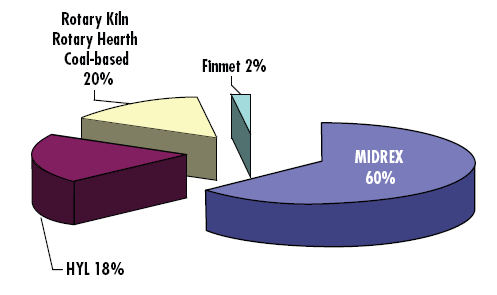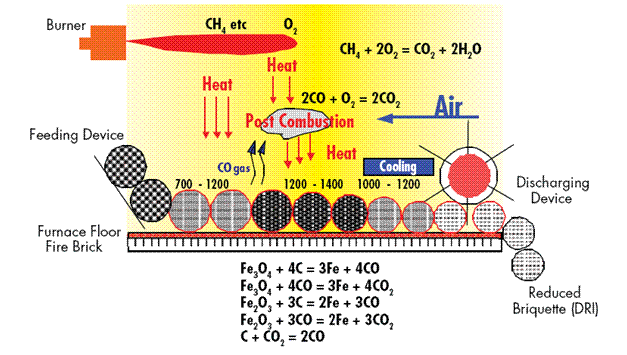
Faculty: Physical and Metallurgical
Speciality: Electric Metallurgy
Metallized raw materials production - the most dynamic part of the world charge market for the steel industry. World production of metallized raw materials in 2006 achieved 60mln. t at the next distribution methods and technologies production (Figure 1). The most promising processes is RHF ( "Fastmet", "Fastmelt", "ITMK3"), but their implementation requires considerable investment costs.


Figure 2 - The processes in the smelting chamber of the ratary hearth furnace
Relevance
Actual less expensive technology of carbothermic process briquettes reduction from technological wastes (slag, dust and sludges steel production) using a heating furnace available metallurgical enterprises of Ukraine. Rising prices for competing commodities: scrap metal and pig iron, tainted scrap metal impurities by non-ferrous metals (copper, zinc, tin, lead), which is practically not removed during subsequent processing, the accumulation of anthropogenic iron-containing wastes (roll scale, BF dust and sludges, BOF, and EAF production), which may be partially recycled in the production of metallized raw materials, development concept of mini-mills, with the technological route: metallized raw materials -steel (EAF), all of which are causes of high interest to the metallized raw materials.
Objective
Investigation of the ore carbothermic reduction processes, which are intended for use as metall charge for the partial replacement of scrap in the future electric arc furnace smelting industry.
Thermodynamic analysis
Iron formation (briquette metallization) by carbothermic process obtaining raw materials from the ore-coal briquettes, will occur with the following parameters:
The energy balance of the recovery process
Performofed the energy balance of of carbothermic reduction ore-coal briquettes in a pusher-type furnace. On the basis of it determine blast furnace and coke gases flow.
Briquette heating
Maked a calculation of heating briquettes duration in furnace. Heat to temperature 1000 Celsius degree occurs for 15-20 min (Fig. 3)
Figure 3 - The dynamics of briquettes heating in a furnace. time (tau) dependence temperature (Celsius degree), t axis (x = 0), half the thickness (x = 0,5 S) and the briquette surface
(x = S) (tau), pp.
Figure 4 - The model pusher-type furnace
Literature
1. Fastmet, Fastmelt and ITmk3: development of new coal-based ironmaking
processes/Direct from Midrex. Special report. Winter 2007-2008.
2. Nagata K., Kojima R., Murakami T., Susa M., Fukuyama H. Mechanism of
pig-iron making from magnetite ore pellets containing coal at low
temperatures // ISIJ. - Vol. 41 (2001), № 11, р. 1316 – 1323.
3. Горбачев В.А. и др. Принципы выбора технологии прямого получения железа. Сталь, №6, 2006г. С. 42-46.
4. Есин О.А., Гельд П.В. физическая химия пирометаллургических процессов. Часть 1. Свердловск. Металлургиздат, 1962. 672 с.
5. Казанцев Е.И. Промышленные печи. Справочник. М. Металлургия, 1975. -368 с.
6. Кудрявцев В.С., Пчелкин С.А. Металлизованные окатыши. М., Металлургия, 1974. – 136с.
7. Иванов А.И., Сафьянц С.М., Зятьев В.П., Пахомов И.А., Самойленко Л.В. Опытно-промышленная проверка технологии получения тяжеловесного металлизованного сырья./ Теория и практика прямого получения железа. М.: Наука, 1986. С. 218-219.
8. Тайц Н.Ю. Технология нагрева стали. М.: Металлургиздат, 1950.-333с.